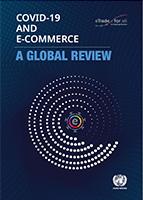
The COVID-19 pandemic has accelerated digital transformations. Digital solutions are increasingly needed to continue some of the economic and social activities remotely. They have been critical for telemedicine, telework and online education, not least to keep alive our social ties in times of physical distancing. We have also witnessed e-commerce growth in developing countries, with long-term implications. However, unless adequately addressed, existing digital divides are likely to result in even greater inequalities.
Against this background, a group of eTrade for all partners joined forces in the midst of the COVID-19 outbreak, with the aim of jointly assessing how the impact of the pandemic was playing out in various regions of the world, what barriers countries and business were facing when trying to leverage digital solutions; what policy responses had been taken; and – not least important – what we could do better to reap synergies and enhance global support to those countries that are the least equipped to manage digital transformation for dealing with the pandemic and beyond.
This study on the impact of COVID-19 on e-commerce and digital trade is a collective effort, and the first research-oriented project undertaken under the eTrade for all umbrella. The work has been led by the United Nations Conference on Trade and Development and the United Nations Regional Commission for Latin America and the Caribbean, drawing also on regional reports prepared by the United Nations Economic Commission of Africa, the United Nations Commission of Europe and the United Nations Economic and Social Commission for Western Asia. Valuable inputs and comments were also received from e-Residency of Estonia, the International Trade Centre, the United Nations Economic and Social Commission for Asia and the Pacific and the Universal Postal Union.
The critical global policy challenge that emerges from this study is that greater efforts are needed to help reduce inequalities in e-trade readiness that currently prevail amongst countries. All stakeholders – governments, businesses, consumers and international development partners – have a responsibility to ensure that e-commerce plays a positive and powerful role in national and international recovery efforts. Resources should be committed to that goal.
The pandemic has also demonstrated the importance of ensuring consistency and avoiding duplication in international efforts. Over the past four years, the eTrade for all has shown the potential for collaboration to add value, especially in LDCs. The initiative will continue to play its part by advocating relevant policy approaches, supporting assessments of national e-commerce environments, and fostering collaborations between national and international stakeholders to maximize the synergies that can contribute to enabling e-commerce for development.
Director, Division on Technology and Logistics, UNCTAD


